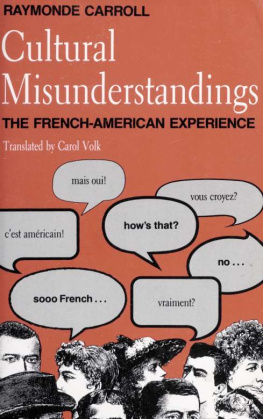Raymonde Carroll - Cultural misunderstandings : the French-American experience
Here you can read online Raymonde Carroll - Cultural misunderstandings : the French-American experience full text of the book (entire story) in english for free. Download pdf and epub, get meaning, cover and reviews about this ebook. year: 1988, publisher: Chicago : University of Chicago Press, genre: Art. Description of the work, (preface) as well as reviews are available. Best literature library LitArk.com created for fans of good reading and offers a wide selection of genres:
Romance novel
Science fiction
Adventure
Detective
Science
History
Home and family
Prose
Art
Politics
Computer
Non-fiction
Religion
Business
Children
Humor
Choose a favorite category and find really read worthwhile books. Enjoy immersion in the world of imagination, feel the emotions of the characters or learn something new for yourself, make an fascinating discovery.
- Book:Cultural misunderstandings : the French-American experience
- Author:
- Publisher:Chicago : University of Chicago Press
- Genre:
- Year:1988
- Rating:3 / 5
- Favourites:Add to favourites
- Your mark:
- 60
- 1
- 2
- 3
- 4
- 5
Cultural misunderstandings : the French-American experience: summary, description and annotation
We offer to read an annotation, description, summary or preface (depends on what the author of the book "Cultural misunderstandings : the French-American experience" wrote himself). If you haven't found the necessary information about the book — write in the comments, we will try to find it.
Cultural misunderstandings : the French-American experience — read online for free the complete book (whole text) full work
Below is the text of the book, divided by pages. System saving the place of the last page read, allows you to conveniently read the book "Cultural misunderstandings : the French-American experience" online for free, without having to search again every time where you left off. Put a bookmark, and you can go to the page where you finished reading at any time.
Font size:
Interval:
Bookmark:

This book made available by the Internet Archive.





For all intercultiirals

f
* f .,
I
* ''
i
f
I
f
r
ft
n
r
j


V
I

xa 'I
, ^
Preface
My studies in anthropology had not entirely prepared me. A few hours after our arrival on Nnkuoro, an atoll in the Pacific where we were to do three years of field research, we were settled in the best house on the island, the house of wood and corrugated iron that belonged to the chief. The next morning, awakened early by a sense of the unfamiliar, 1 discovered that the chief had slept on the verandah floor (to protect onr possessions, he told me); he had prepared coffee for us and had washed onr baby's diapers, dhe anthropologist in me did not express astonishment; 1 only thanked him for his kindness, dhe next morning, the same scenario; the following day as well. No matter how mneh 1 protested, he continued to wash the diapers, despite the evident surprise of the other Nnkuoro. He seemed, moreover, to want to draw attention to this nneommon activity, since he had begun to do this washing in the middle of the day, in full view of everyone in the village.
I hen the chief, who spoke Knglish fluently, asked me, with a stern look, if 1 had clipped my baby's fingernails. I thereupon performed this task, under his attentive gaz.e. He began to watch my every move, but only insofar as it concerned the baby. As our daughter, according to the Nnkuoro, was the first white baby that most of them had ever seen or touched, she was a celebrity, and 1 was not overly surprised by the extraordinary attention the chief lavished upon her. But the fifth day, as 1 was giving my daughter some baby food under the same watchful eyes, the chief calmly announeed that he had decided, actually upon our arrival, that he would take her in adoption, and that he felt the time had come to tell me.
Prom something theoretical and exciting, anthropology abruptly became something difficult to live. Phat day, 1 understood the urgency and distress of certain intercultural exchanges.
X
Preface
In this case, however, the difficulty was not insurmountable: the situation was delicate, but the misunderstanding was at least visible, recognizable, apparent; it was therefore only a matter of finding an adequate response, which I did, of course, once the first moment of panic had passed.
I later discovered how much greater were the consequences of those cultural misunderstandings that only analysis can bring to light. My fieldwork has not stopped since. It has, in fact, invadedand pervadedmy daily life.
The present work might be presumptuous if it were not, first of all, a look at myself, a reading of self. It is the product of a polycultural childhood and youth, of an intercultural marriage, of anthropological studies and research, of teaching my language and literature in a foreign country, of hetero- and homocultural friendships in a foreign eoLintry. Cultural analysis has allowed me to domestieate this eon-stantly reinforeed sehizophrenia, to aeeept it fully, and, finally, to savor its riehness and creativeness.
I married an Ameriean, an anthropologist by trade. My eulture, his eulture, intereultural misunderstandings, the eomedy of errors, the pain of ineomprehensible snags, the eonstantly renewed awareness of deep and faseinating differenees, the interpretations, theories, and impassioned and passionately interesting discussions have, for over twenty years, been everyday oeeurrenees.
My teaching, in several Ameriean universities, has drawn its form and perspeetive from a leitmotiv in the commentary of my students when faeed with any type of P reneh text (whether eultural, literary, linguistic', cinematographic, or musical): I find it sort of weird, or else It was very bizarre, and similar variations on this theme. In order to make them understand sueh a text, in order to make them love it, 1 first had to understand the strageness of what I had found beautiful and had never had to question, to subjeet it to a new type of analysis, a cultural analysis.
bAperiences of this kind led me to do fieldwork in Franee and in the United States, just as 1 had done for three years on Nukuoro, the Polynesian atoll in Mieronesia to whieh I alluded earlier: field research, with all the customary interviews, tape reeordings, observations, and field notes.
Over the past ten summers, I interviewed informants in Nor
Ireface
xi
niandy, Paris (and environs), La Rochelle, Tours, tlie l arn region (in particular in one very small village), and the Midi. 1 interviewed French people of all sorts, from a famous writer to a nineh'-year-old former waitress. They all granted interviews with the same grace. In the United States, I saw reflections of my behavior in that of other French people, whom I met in large numbers. French people of all sorts: longtime residents, some adapted, some unadaptable, some right off the boat, some celebrities on tour, some first-time visitors, some habitual visitors; people of all ages, some passing through, some who knew it all and some who were curious, some who were enthusiastic and some who were blase... French men and French women. Some irritated me, some (at times) embarrassed me. But they all enriched me with their (conscious or unconscious) testimonies; they all gave me the gift of their presencean inexhaustible source of living texts. I would like to thank them for that here.
As for Americans, they have been all around me for more than twenty years, always present, since I live in their country. Fhey too have been constantly interviewed, recorded, observed. With them too 1 have chatted, talked seriously, laughed, cried, loved, reflected shared everything. 1 thank them all here too.
On both sides, the same remarks about the other culture were repeated with a eompelling regidarity which called for attention. Sometimes it seemed as if the misunderstandings were so ingrained that the Americans and the French would never be able to understand each other. Yet on both sides I found the same desire to understand the other, as was apparent in the interest shown whenever 1 proposed my interpretations. In fact, I began writing this book because those with whom 1 shared my analyses constantly encouraged me to do so, assuring me that these analyses had been useful to them and would be for others. 1 was struck repeatedly by the frequency of intercultural misunderstandings, principally in our close interpersonal relationships, by the number of wounds, deep and superficial, that were essentially due to the profound differences in our cultural premises.
Font size:
Interval:
Bookmark:
Similar books «Cultural misunderstandings : the French-American experience»
Look at similar books to Cultural misunderstandings : the French-American experience. We have selected literature similar in name and meaning in the hope of providing readers with more options to find new, interesting, not yet read works.
Discussion, reviews of the book Cultural misunderstandings : the French-American experience and just readers' own opinions. Leave your comments, write what you think about the work, its meaning or the main characters. Specify what exactly you liked and what you didn't like, and why you think so.












